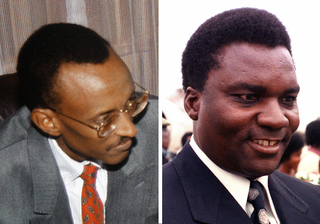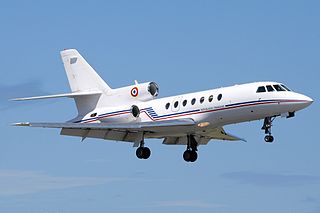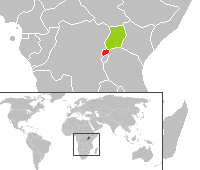| |||||
| Decades: | |||||
|---|---|---|---|---|---|
| See also: | Other events of 1993 List of years in Rwanda | ||||
The following lists events that happened during 1993 in Rwanda .
| |||||
| Decades: | |||||
|---|---|---|---|---|---|
| See also: | Other events of 1993 List of years in Rwanda | ||||
The following lists events that happened during 1993 in Rwanda .

Juvénal Habyarimana was a Rwandan military officer who served as the second president of Rwanda, from 1973 until 1994. He was nicknamed "Kinani", a Kinyarwanda word meaning "invincible".

The United Nations Assistance Mission for Rwanda (UNAMIR) was established by United Nations Security Council Resolution 872 on 5 October 1993. It was intended to assist in the implementation of the Arusha Accords, signed on 4 August 1993, which was meant to end the Rwandan Civil War. The mission lasted from October 1993 to March 1996. Its activities were meant to aid the peace process between the Hutu-dominated Rwandese government and the Tutsi-dominated rebel Rwandan Patriotic Front (RPF). The UNAMIR has received much attention for its role in failing, due to the limitations of its rules of engagement, to prevent the Rwandan genocide and outbreak of fighting. Its mandate extended past the RPF overthrow of the government and into the Great Lakes refugee crisis. The mission is thus regarded as a major failure.

Faustin Twagiramungu is a Rwandan politician. He was Prime Minister from 1994 until his resignation in 1995, the first head of government appointed after the Rwandan Patriotic Front (RPF) captured Kigali. He then exiled himself to Belgium.

Agathe Uwilingiyimana, sometimes known as Madame Agathe, was a Rwandan political figure. She served as Prime Minister of Rwanda and acting president from 18 July 1993 until her assassination on 7 April 1994, during the opening stages of the Rwandan genocide.
The Arusha Accords, officially the Peace Agreement between the Government of the Republic of Rwandaand the Rwandan Patriotic Front, also known as the Arusha Peace Agreement or Arusha negotiations, were a set of five accords signed in Arusha, Tanzania on 4 August 1993, by the government of Rwanda and the rebel Rwandan Patriotic Front (RPF), under mediation, to end a three-year Rwandan Civil War. Primarily organized by the Organisation of African Unity and the heads of state in the African Great Lakes region, the talks began on 12 July 1992, and ended on 4 August 1993, when the accords were finally signed.
Pasteur Bizimungu is a Rwandan politician who served as the third President of Rwanda, holding office from 19 July 1994 until 23 March 2000.
Joseph Kavaruganda was a Rwandan jurist who served as president of Rwanda's Constitutional Court. He was killed at the beginning of the Rwandan genocide.

The assassination of presidents Juvénal Habyarimana and Cyprien Ntaryamira in the evening of April 6, 1994 was the proximate trigger for the Rwandan genocide, which resulted in the murder of approximately 800,000 Tutsi and a smaller number of moderate Hutu. The first few days following the assassinations included a number of key events that shaped the subsequent course of the genocide. These included: the seizing of power by an interim government directed by the hard-line Akazu clique; the liquidation of opposition Hutu politicians; the implementation of plans to carry out a genocide throughout the country; and the murder of United Nations peacekeepers, contributing to the impulse of the international community to refrain from intervention.

The Rwandan Civil War was a large-scale civil war in Rwanda which was fought between the Rwandan Armed Forces, representing the country's government, and the rebel Rwandan Patriotic Front (RPF) from 1 October 1990 to 18 July 1994. The war arose from the long-running dispute between the Hutu and Tutsi groups within the Rwandan population. A 1959–1962 revolution had replaced the Tutsi monarchy with a Hutu-led republic, forcing more than 336,000 Tutsi to seek refuge in neighbouring countries. A group of these refugees in Uganda founded the RPF which, under the leadership of Fred Rwigyema and Paul Kagame, became a battle-ready army by the late 1980s.
Tharcisse Renzaho is a Rwandan soldier, former politician and war criminal. He is best known for his role in the Rwandan genocide.

The Amahoro Stadium, officially known as Amahoro National Stadium, is a multi-purpose stadium in the Gasabo district of Kigali, Rwanda. With a capacity of 25,000, it is the largest stadium in Rwanda and hosts football matches, concerts, and public events. The football clubs Armée Patriotique Rwandaise F.C. and Rayon Sports F.C. are the tenants. The venue is also sometimes used for rugby union.
Jean Mutsinzi is a Rwandan former jurist in the African Court on Human and Peoples' Rights. He was elected for a six-year term of office on 22 January 2006 at the Eighth Ordinary Session of the Executive Council of the African Union, held in Khartoum, Sudan.

On the evening of 6 April 1994, the aircraft carrying Rwandan president Juvénal Habyarimana and Burundian president Cyprien Ntaryamira, both Hutu, was shot down with surface-to-air missiles as it prepared to land in Kigali, Rwanda. The assassination set in motion the Rwandan genocide, one of the bloodiest events of the late 20th century.

The following is a partial chronology of significant events surrounding the 1994 Rwandan genocide.
These are some of the articles related to Rwanda on the English Wikipedia pages:

United Nations Security Council resolution 812, adopted unanimously on 12 March 1993, after expressing its alarm at the humanitarian situation in Rwanda due to the ongoing civil war, in particular the number of refugees and displaced persons which posed an international threat to peace and security, the Council called upon the Government of Rwanda, the National Republican Movement for Democracy and Development, and the Rwandan Patriotic Front to respect a ceasefire that took place on 9 March 1993 and implement other agreements they had committed themselves to. It was the first resolution on the situation in Rwanda.

United Nations Security Council resolution 846, adopted unanimously on 22 June 1993, after reaffirming Resolution 812 (1993) on the situation in Rwanda and noting a report by the Secretary-General Boutros Boutros-Ghali, the Council established the United Nations Observer Mission Uganda–Rwanda (UNOMUR) for an initial period of six months.

United Nations Security Council resolution 912, adopted unanimously on 21 April 1994, after reaffirming all resolutions on the situation in Rwanda, particularly resolutions 872 (1993) and 909 (1994), the Council expressed its alarm and condemnation of the large-scale violence in the country which resulted in the death of thousands of innocent civilians, and proposed a revised mandate of the United Nations Assistance Mission for Rwanda (UNAMIR).

United Nations Security Council resolution 918, adopted without a vote on 17 May 1994, after reaffirming all resolutions on the situation in Rwanda, particularly resolutions 872 (1993), 909 (1994) and 912 (1994), the Council expressed its alarm and condemnation at the continuing large-scale violence, and went on to impose an arms embargo on the country and authorised an expansion of the United Nations Assistance Mission for Rwanda (UNAMIR).
Déogratias Nsabimana was a general and Chief of Staff of the Rwandan Armed Forces (FAR), under President Habyarimana from April 1992 until he was killed on 6 April 1994. He also served as Minister of Defense.